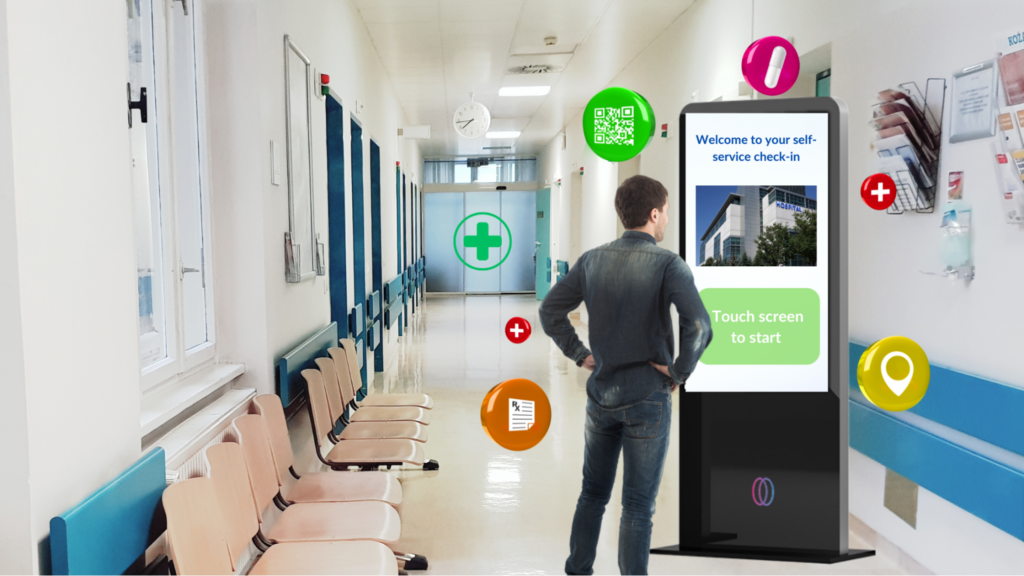
The traditional hospital experience is often accompanied by long wait times, long paperwork, and frustration. However, recent technological advancements are transforming the healthcare industry, and self-service kiosks are an essential part of this transformation.
These interactive kiosks in hospitals empower patients to take control of their healthcare journey while simultaneously improving hospital efficiency. Their implementation reduced the intervention time by 13.6 minutes and had a 97% usability rate across the Emergency Department groups. Let’s look at the top 10 benefits of self-service kiosks in hospitals.
What Are The Benefits of Self-Service Kiosks in Hospitals?

Today, patients and hospitals seek ways to improve efficiency and enhance the overall healthcare experience. Here, self-service kiosks emerge as game-changers, offering a win-win situation for all parties involved. Here’s a closer look at ten key benefits that self-service kiosks provide in a hospital:
1. Reduced Waiting Times
A report on Nature.com states that entry times in the emergency department are being reduced by almost 25% with the implementation of self-service kiosks. Patients can independently breeze through check-in, appointment scheduling, and insurance verification, bypassing reception desk queues using self-service kiosks.
2. Enhanced Efficiency
Kiosks automate routine administrative tasks, significantly impacting hospital workflow. Check-in processes become faster, staff can access patient information instantly, and appointment scheduling can be streamlined. This translates into improved operational efficiency for the entire hospital.
3. Improved Accuracy
Data entry errors are a concern in any healthcare setting. Kiosks eliminate the potential for mistakes associated with manual data entry by allowing patients to input their information directly. This ensures the accuracy of patient records, minimising the risk of errors that could lead to delays or complications.
4. Greater Patient Empowerment
Self-service kiosks empower patients by placing them in control of their healthcare experience. Patients can update personal information, schedule appointments at their convenience, access test results, and even make co-payments* – all through the user-friendly interface of the hospital kiosk. This fosters autonomy and reduces hospital staff’s dependence on routine tasks.
*Note: Co-payment is a fixed amount that a policyholder must pay against the medical expenses, while the insurer will pay for the remaining amount during claim settlement
5. 24/7 Accessibility
Self-service kiosks are available 24/7. This allows patients to check in for appointments, update information, or schedule follow-ups anytime. This flexibility is particularly beneficial for patients with busy schedules or those seeking emergency care after regular office hours.
6. Multilingual Support

Hospitals cater to a diverse patient population. Kiosks can be programmed to offer multilingual support, ensuring clear communication regardless of a patient’s native language. This eliminates language barriers and fosters a more inclusive healthcare environment.
7. Increased Patient Satisfaction
Reduced wait times, improved efficiency, and greater control over their healthcare journey all contribute to a more positive patient experience. A National Library of Medicine study states that self-service kiosks can significantly improve patient satisfaction scores. Thus, Kiosks are crucial in creating a patient-centric healthcare environment by minimising frustration and enhancing convenience.
8. Streamlined Payment Processing

Kiosks can be integrated with hospital payment systems, allowing patients to settle bills conveniently and securely. This eliminates the need to wait in line for cashiers and offers patients a variety of payment options, including debit cards, credit cards, and even contactless payments.
9. Improved Data Collection
Kiosks can collect valuable patient data, such as health history updates, medication changes, and feedback on their experience. This data can be seamlessly integrated with electronic health records (EHRs), granting healthcare providers a more comprehensive view of a patient’s health.
10. Reduced Administrative Costs
Self-service kiosks can significantly reduce administrative costs for hospitals. Fewer staff are required to manage routine tasks like check-in and appointment scheduling, freeing them to focus on more critical areas. Additionally, the elimination of paper forms reduces printing and storage costs.
Read more: What is Kiosk Marketing and How Does It Work?
Will Self-Service Kiosks in Hospitals Impersonalise the Experience?

While kiosks offer numerous benefits, like faster check-in times and greater patient control, some worry they might impersonalise the healthcare experience. Here, we’ll look into the strategies that work for creating a balance:
- Kiosks as a Supplement, Not a Replacement: Kiosks should be seen as tools to enhance, not eliminate, human interaction. Staff should readily assist patients who need help or prefer a personal touch.
- Prioritising User Experience: Kiosk interfaces are designed with empathy in mind. Thus, including multiple sets of instructions, easy navigation systems, and features for those with disabilities are essential to the user interface.
By carefully considering these factors, hospitals can use the self-service kiosks while ensuring a welcoming and patient-centred environment.
Your Patient’s Healthcare Journey Starts Here
Self-service kiosks represent a valuable tool for enhancing patient experience and hospital operations. By facilitating a more efficient and patient-centred approach, kiosks are transforming the healthcare industry, paving the way for a more streamlined and satisfying experience for everyone involved.
Today, OgmentO is a leading provider of innovative kiosks and smart vending solutions specifically designed for the healthcare industry. Our user-friendly kiosks cater to patients of all backgrounds, offering a seamless and secure platform for check-in, appointment scheduling, and more. Contact OgmentO today to discuss how our customised kiosk solutions can transform your hospital and empower your patients.

